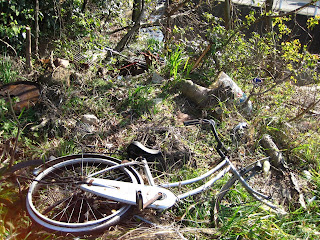Speaking of disappearing...my jitensha seems to have disappeared. And it happened at the most inopportune time. After returning home from a strenuous day of teaching cute little children I realized that my keys were on the opposite side of the door-the side opposite me. And Joe wouldn't be home for five more hours. As I pressed my forehead against the door while thinking what to next it was most frustrating to know that my keys were dangling from their hook just inches away from my head-on the opposite side of the door. So, what else to do but hop on a train and meet a friend for dinner.
I returned three hours later to find my prized bicycle missing-because I couldn't lock it without the keys-that were on the opposite side of the door. I hope the creep that swiped my bike didn't realize the brakes were out and crashed into an irrigation canal.
I find it very curious that in a country where people won't cross the street on a red light, it is acceptable to steal a bicycle that obviously belongs to someone. I have been told that it isn't really considered stealing, but rather "borrowing". If someone needs to get somewhere they will borrow an unlocked bike, ride it to their destination, and then leave it. Often times they'll turn up months later.
This brings me to the other very curious contradictions that I have discovered about Japan. Forget the obvious contradiction of traditional culture versus the ultra modern. These aren't easily visible; it's taken me the six months I've been here to become aware of some.
I. Eco V Not
Japan has a very organized and precise method for trash collection. It must be separated into many different categories: burnables and food garbage, soft plastics, hard plastics glass and metal, PET bottles (without the labels-which clearly fit into the soft plastic category), PET lids, and batteries. My town has different colored bags for each category. At my workplace there are no less than eight different bins!! What I find most comical is that quite often Joe and I aren't sure what category things fall into; at which point a serious debate will ensue as to whether it might be soft plastic, hard plastic, or food garbage. Pros and cons will be weighed out for each category until a winner is selected. Every week when I take the trash out I cross my fingers in hope that it won't be rejected by the garbage police. If they see you have incorrectly sorted, your garbage will find itself right back on your doorstep!

At first I was so impressed by this method-so impressed that cities make their residents work just a little harder so recycling is that much easier. But I've come to learn that the efforts of trash separation are all in vain! It's all just incinerated! I have also come to learn that the people of my town seem to find it quite convenient to dump unwanted appliances, cars, boats, and equipment on country roads, where I assume it is their hope that left objects will quickly become overgrown with vines so no one will notice. Oddly, littering is also very prevalent. Maybe people are secretly rebelling against the insane methods of trash collection?
II. Red Light, Green Light
As mentioned earlier, Japanese people will not under any circumstance J-walk or cross the street on a red light-whether cars are present or not. Running red lights in a car, on the other hand, is no problem! I cannot explain this as I still don't understand it myself.
III. Shitty Situation
And here we arrive at the perplexing situation surrounding the shitter. You will come across two varieties here in Japan (if you are lucky it will be option B). The contrast between the two options is so stark it is startling. And yet no one seems to mind using Option A in public restrooms (and you can bet their homes are equipped with Option B!).
Option A: A simple recess in the ground which one can squat over.
IV. Busy V Sleepy
The work environment in Japan is one that encourages it's workers to appear to be frantically busy all the time. I have been told, as well as seen first hand at school, that it is very important to appear to be busy at all times. Actually I have become quite good at this myself, as I often arrive to school in the morning only to find all my classes canceled for the day. While it is important to appear busy at all times, it is also totally acceptable to take power naps at ones desk at any time throughout the day. It isn't uncommon to see someone taking a power nap during a meeting either (although they might say closing their eyes helps them concentrate on what the speaker is saying). There does seem to be some protocol in the napping dept. though. Napping should be done in the upright position, and as a rule should not last more than fifteen minutes.
It should be noted that I am absolutely enraptured by Japan, her people, beauty, and even contradictions. So much so, that I have signed another year-long contract. I am looking forward to the next 17 months with excitement and anticipation; and I look forward to discovering more curious contradictions too!





No comments:
Post a Comment